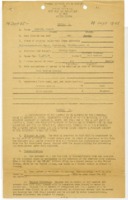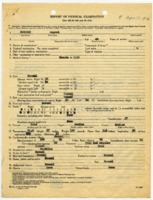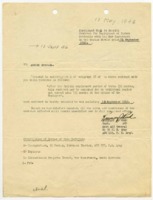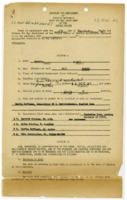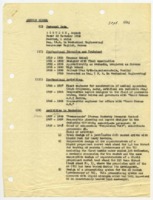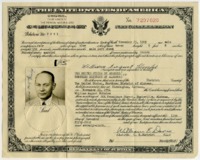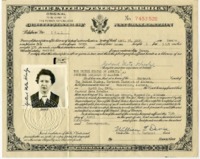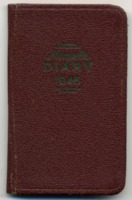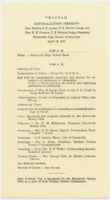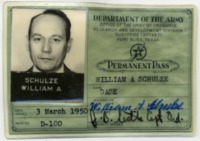
Browse Items (2178 total)
Sort by:
-
Special Contract for Employment of German Nationals with the War Department in the United States.
This special contract outlines the conditions of August Schulze's employment as an engineer in the United States. The document also includes instructions regarding the engineers' housing, dependents, mail, termination of contract, and burial. -
Report of Physical Examination.
This report documents August Schulze's physical condition after his arrival in the United States. -
Supplements to Special Contract for Employment of German Nationals with the War Department in the United States.
The two supplements extend August Schulze's employment in the United States to November 21, 1946. On the back of Supplement No. 2, Schulze lists amenities and their prices. -
Contract for Employment of Foreign Nationals with the War Department of the United States.
This contract outlines employee benefits, policies regarding the movement of dependents from Germany to the United States, and conditions of secrecy, noting that "as a condition to admittance to this country and employment hereunder, employee agrees to observe such security measures as the President of the United States may direct with respect to the project here involved." The contract also includes an enclosure clarifying that Schulze's wife and daughter may move to the United States as soon as possible. -
Résumé of August Schulze.
This résumé outlines Schulze's professional activities and activities in rocketry. The document notes his interrogation by the United States and outlines plans for his "Contemplated Activity" as "Chief of the Subsection 'Thrust Unit'." -
Certificate of Naturalization for Gertrud Meta Schulze.
Gertrud Schulze was naturalized on the same day as her husband, William August Schulze. The back of the certificate notes that her name was legally changed at the same time she was naturalized. -
1946 day book.
Written by William A. Schulze, this day book includes notes from his activities at Army Proving Ground at Aberdeen, Maryland in early 1946. Schulze was transported from Germany to Aberdeen in late 1945 as part of the first group of German engineers sent to the United States. During the week of March 17-23, Schulze records his travel from Aberdeen to El Paso, Texas, leaving on Monday, March 18, and arriving in Texas on Thursday, March 21. The day book includes entries on shopping, leisure activities, birthdays, and mail. Schulze's notes reference H. N. Toftoy, Konrad Dannenberg, Wilhelm Jungert, Hannes Luehrsen, Theo Poppel, Erich Neubert, Walter Schwidetski, and others. -
Naturalization ceremony program.
Held at the Huntsville High School auditorium, the ceremony naturalized many of the German engineers who were transferred to Huntsville in 1950. -
Department of the Army Permanent Pass.
This pass was issued by the Office of the Chief of Ordnance, Research and Development Division Suboffice (Rocket), at Fort Bliss, Texas.
